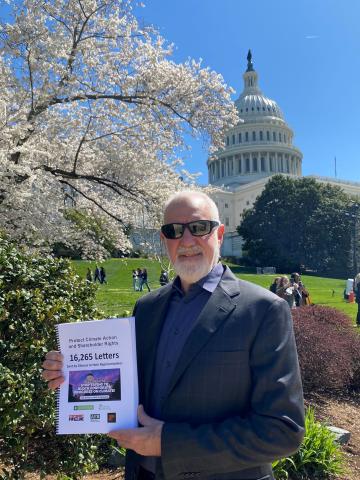
When as you sow CEO Andrew Behar testified before the House Judiciary Committee’s legal counsel on March 28 of this year, he brought with him letters from 16,265 Green Americans and others demanding the freedom to invest responsibly.
As You Sow’s work is being investigated by the Republican-led committee, alongside 13 other shareholder organizations, pension funds, banks, and others who use environmental, social, and governance (ESG) criteria in assessing companies’ sustainability risks and long-term profit potential. Behar says the committee’s investigation is part of a coordinated crackdown on ESG investing nationwide, telling Democracy Now that “it’s a very orchestrated campaign,” financed by right-wing groups that also fund organizations like the Federalist Society.
The organizers of the letter-writing campaign—led by Green America and As You Sow, along with the American Sustainable Business Network (ASBN), Americans for Financial Reform, Stop the Money Pipeline, and Third Act—are taking on the backlash against responsible investing not just at the federal level, but in statehouses across the country.

“The climate crisis, driven by burning fossil fuels, is now starting to affect people’s finances—insurance and investments being prime examples,” said Cathy Cowan Becker, responsible finance campaign director at Green America. “But instead of changing their business model, fossil fuel interests are trying to ban people from considering environmental and social issues in financial decisions. It’s anti-free market, and we must stand up to it.”
In addition to providing committee testimony, on his trip to Washington, DC, Behar took the time to visit congressional offices and explain why ESG investing is good for business, as well as for people and the planet. He said the support of individual investors and outspoken Green Americans was valuable in convincing congressional offices to pay attention to the threat responsible investing faces nationwide.
“I want to send huge amounts of gratitude to the folks who signed each letter [in favor of protections for ESG investing],” said Behar, “I can tell you firsthand it made a huge difference to how we were received and how we’re going to be working with each of these Congress people going forward…This is what democracy looks like.”
State-Level Rollbacks on Investor Freedom
As of April, Green America and its allies were tracking the progress of 151 state-level anti-ESG bills in 28 states, including 58 bills carried over from 2023. These bills are in addition to the more than 20 initiatives that succeeded in 2023 in restricting investor freedom in Alabama, Arkansas, Florida, Idaho, Indiana, Kansas, Kentucky, Louisiana, North Carolina, North Dakota, Texas, Utah, and West Virginia.
Pleiades Strategy, an advisory service for mission-focused organizations, maintains a tracker of all ongoing state-level anti-ESG legislation. Their 2023 report on state-level legislation outlined three broad categories that encompassed most state-level bills passed last year:
1. Restrictions on state financial contracts:
This legislation forbids states from contracting with financial-services companies that limit their work with certain harmful industries, such as fossil-fuel companies and weapons manufacturers. Even minor limitations on some investments have been enough to land large financial-services companies like BlackRock and JP Morgan Chase on state blacklists, despite their overall huge investments in fossil fuels. These initiatives often cite “discrimination” against such industries by ESG-practitioners among their rationale and passed in six states in 2023.
2. Restrictions on state pension funds:
This legislation restricts state investment managers from using ESG factors to control for risks in state-managed retirement funds. Initiatives passed in ten states.
3. Restrictions on state business contracts:
Similar to bills restricting state contracting with ESG-focused financial-services organizations, some state-level bills seek to ban contracting with companies that use ESG criteria in their operations. Legislation in this category passed in five states.
States that have instituted blacklists or other ESG restrictions on state-sponsored financial products have experienced diminished financial performance, harming their own state finances through these initiatives. For example, a study conducted by the consulting group TXP for the Texas Association of Business found that a Texas ban on contracting with banks that consider ESG criteria ultimately cost the state an extra $270 million in annual excess transaction costs.
Continuing Federal-Level Threats
At the federal level, the most recent threat to responsible investing comes from a bill re-introduced by Rep. Greg Murphy (R, NC) at the end of March that largely follows the pension-fund restriction model (#1) cited above.
Murphy’s bill, co-sponsored by Reps. Mike Kelly (R, PA), Claudia Tenney (R, NY) and Beth Van Duyne (R,TX), was referred to the House Ways and Means Committee. The misleadingly named “Safeguarding Investment Options for Retirement Act” would threaten tax-advantaged retirement plans with loss of their preferred tax status if plan managers consider ESG priorities when making investment decisions.
Murphy has described his goal as “eliminat[ing] ESG from investment retirement plans,” and has accused investment managers of allowing responsible retirement planning to be used as a “pawn in the left’s environmental and equity agenda.” Murphy’s bill would require managers to consider only “risk and return” factors when making investment decisions.
However, as Behar explained following his recent testimony on Capitol Hill, responsible investors do focus on risk factors relevant to the businesses in which they invest—including long-term environmental and equity risks that Murphy and other ESG opponents claim do not matter.
Behar cited a 2023 study by IBM of 5,000 company executives across 22 industries that found nearly three-quarters of surveyed companies viewed ESG priorities as “revenue enablers,” meaning that managing ESG risks could help them maximize profits. Behar described the anti-ESG movement as fundamentally “anti-business and anti-freedom,” emphasizing that companies and investors should have the right to review risks from the perspectives of all a company’s stakeholders.
“That means that you take care of your employees, you take care of your customers, the communities where you operate, and your supply chains” Behar told Green America. “And that leads to greater competitive strength and long-term sustainable growth for your shareholders.”
Questions to ask candidates:
- Do you support the freedom of investment managers to consider ESG risks to a company's profitability when making investment decisions?
- Do you support the right of employees to invest in ESG options in their 401(k) plans?
- Will you oppose any federal/state efforts to restrict companies' use of ESG criteria in their operations?
- How will you protect investor freedom if elected?







